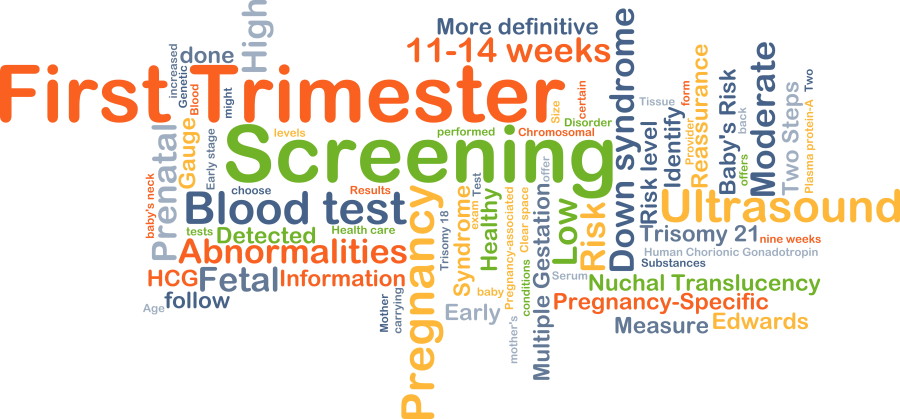Several years ago, a friend of the family was pregnant with twins. A screening test suggested that one or both of the twins might be born with trisomy 21, also known as Down syndrome. Our friend elected not to have any further testing. She and her husband agreed that they would have the babies no matter what. The test turned out to be a false positive. Both babies were born without Down syndrome.
The word trisomy refers to a birth defect caused by an additional chromosome. Down syndrome is the most common type of trisomy, but there are two others. You can be screened for all three. Children with Down syndrome can be mentally challenged, they can have heart defects, but most can lead full and meaningful lives. Children with trisomy at chromosome number 13 and 18 have profound mental retardation, multiple birth defects, and rarely survive more than a few months.
First Trimester Screening
A first trimester screening test can tell you if you are at high risk for giving birth to a baby with Down syndrome or another trisomy. If your screening test is positive, you may decide to have further testing. The most definitive tests are called diagnostic tests, but these carry a slight risk of causing a miscarriage. Your health care provider should discuss all the risks and options during your first trimester. One option is not to have a screening test. Before you talk to your provider, you should ask yourself some questions:
- Would you want to proceed with your pregnancy no matter what your screening test says? Does that mean declining to have the test?
- Would the decision to have the test change if your baby was at risk for a more serious trisomy 13 or 18?
- If a screening test is positive, would you want to get a definite answer from a diagnostic test?
- Are you willing to take the small risk of miscarriage from a diagnostic test?
- Would adoption or termination of pregnancy (abortion) be an option for you?
- Even if adoption or termination is not an option, would you prefer to have advanced awareness, so that you can prepare for a baby with Down or another trisomy?
These are all tough decisions that only you, your spouse, and your health care provider can make. Thinking about your options and understanding the screening and diagnostic tests ahead of time may help you make the best decision for you. Here are the tests you should know about:
- The first trimester combined test is a blood test that can be done after your 11th This test combines a blood test and an ultrasound exam. The blood test looks for an abnormal level of a pregnancy protein and hormone. The ultrasound looks for fluid beneath the skin of your baby’s neck. These tests along with your age can be used to tell if trisomy is a risk. Risk is not the same as diagnosis. If you choose to know more, you need more information.
- The second semester quad screen is similar to the first trimester screen but with some additional blood tests. This screen is more accurate and can be done after 16 weeks.
- Cell-free fetal DNA analysis is the most accurate screening exam. It is a blood test. You may opt for this test if any of the other screening tests are positive. This test looks at your baby’s DNA in your blood. It can be done any time after 10 weeks. Trisomy in 21, 13, or 18 can be predicted with over 90 percent accuracy.
- If you are considering a termination of your pregnancy or you want to know with close to 100 percent accuracy you will need diagnostic testing. These tests take a DNA sample directly from inside your womb. Amniocentesis takes a sample from the fluid in your womb and is usually done in the 2nd There is slight risk of miscarriage. Chorionic villus sampling takes a DNA sample from your placenta. It can be done after 10 weeks, the risk of miscarriage is slightly higher.
The last thing you want to think about during pregnancy is a birth defect, but screening decisions have to be made. Better to start thinking about these decisions now and to have some understanding of your options before the conversation starts.


